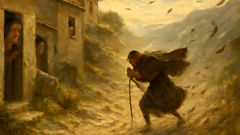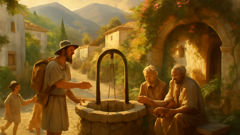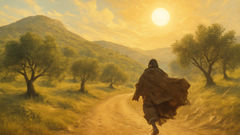Introduction
In the cradle of civilization, where wild thyme and sun-warmed olives sweeten the breeze, ancient Greece stirs with fables as old as its olive groves. Shepherds and travelers once wandered across stony hills and sun-baked valleys, listening for the voices in the wind. Here, between sun-bleached temples and the restless Aegean, stories moved like the clouds—drifting, reshaping, returning. Among them, none shimmered with such simple wisdom as the contest between the North Wind and the Sun. This tale has been told and retold along goat paths and marble forums, its lesson echoing through centuries: true influence doesn’t roar or rage, but arrives on a gentle breeze, warm and persistent. To step into this story is to feel the heartbeat of old Greece—the land of myth, where the elements themselves are alive, proud, and ever eager to test their power. Imagine the vast sky stretching above a golden countryside, the air brimming with possibility, as the immortal North Wind and the radiant Sun cast their gaze upon a solitary traveler. Their rivalry is more than a quarrel of weather; it’s a clash of philosophies, an ageless debate between force and persuasion. This is not a simple retelling, but a journey into the details: the feel of rough wool against skin, the taste of salt on the breeze, the shifting moods of gods and men alike. As you follow the traveler’s path, you’ll encounter the North Wind’s bluster and the Sun’s silent resolve, each woven into a tapestry of landscape and legend. In ancient Greece, wisdom was a treasure as precious as gold, and this story offers its lesson with every step along the winding road.
The Challenge on the Hilltop
The morning unfurled over the hillsides of Arcadia, where sunlight crept across wild rosemary and ancient stones. Above the world, the North Wind circled in invisible eddies, sharpening his edge on the mountain peaks. He watched as the Sun rose, golden and serene, flooding the valleys with warmth that coaxed poppies open and sent shadows scurrying from shepherds' huts. To mortals, these were only the workings of nature. But the gods knew better: today, rivalry would awaken, old and deep as the roots of cypress trees.

The North Wind, called Boreas by those who revered or feared him, was proud and impetuous. His gusts battered the coasts, bent pines sideways, and rattled shutters in the villages below. Yet, for all his strength, he often felt overlooked beside his celestial sibling, the Sun, whose touch made wheat fields shimmer and ripened figs on their boughs. Boreas seethed with a restless energy, longing to prove his superiority. Today, he found his opportunity.
Down the winding road that led from the mountain temple to the distant city of Thebes trudged a traveler—a solitary figure wrapped in a thick, dark cloak. The man’s steps were weary but determined, his face set against the chill that clung to dawn. Over his shoulder hung a satchel, worn from many journeys. From his posture, it was clear he guarded not only his belongings but also the warmth that the North Wind was eager to steal.
Boreas saw the traveler and turned to the Sun, who lounged among gentle clouds like a king in his court. "See that mortal below?" he boomed, his voice echoing over the ravines. "Let us make a wager. I claim I can force him to cast aside his cloak with my might alone."
The Sun, radiant and composed, gave a mild laugh that seemed to brighten the sky. "And if your force fails, Boreas? Will you concede that gentleness surpasses bluster?"
"Let us see!" snapped Boreas. "The winner shall claim the title of most powerful among the sky’s rulers."
So, the game began. The Sun drew back behind a soft haze, cooling the land, while Boreas gathered his strength. He howled down the mountain slopes, sending birds fleeing from their roosts and bending the cypress groves. Dust swirled around the traveler, who hunched his shoulders and pulled his cloak tighter. Boreas, undeterred, blew harder. His winds clawed at the traveler’s garments, tugged at the satchel strap, tried to wrench away the woolen cloak. But the man only gripped his cloak tighter, wrapping it around himself as if it were a shield.
Villagers peered from their doors, marveling at the sudden gale. Sheep huddled behind stone walls, and even the olives seemed to shrink from the North Wind’s fury. The traveler stumbled but did not falter, eyes squinting against dust and cold. Each blast of wind only made him more determined to protect what little warmth he had.
From above, the Sun watched in silence, knowing the lesson would reveal itself in time. Boreas raged until his strength ebbed, leaving only a shivering quiet across the hills. The traveler paused on the path, breathing heavily, sweat and chill mingling on his brow. His cloak, far from being shed, clung tighter than ever. The North Wind’s power had met its match—not in resistance, but in stubborn necessity. It was now the Sun’s turn to demonstrate a different kind of strength.
The Sun’s Gentle Triumph
As the tumult faded, the Sun emerged from behind a silken veil of clouds, his face radiant with calm assurance. His light spilled over the hills, banishing the North Wind’s lingering chill. The grass seemed to uncurl, and birds returned to their songs, fluttering through the olive branches as if nothing had disturbed their morning.

The traveler, feeling the sudden change, paused at the crest of the hill. A bead of sweat traced his brow, for the air had turned gentle and inviting. The Sun’s warmth touched him not with force, but with patient persistence. It seeped through the woolen folds of his cloak, soothing the aches in his shoulders and breathing golden life into his weary limbs.
He walked on, but with each step, the embrace of the Sun became more persuasive. The heat gathered steadily, neither stifling nor harsh. The traveler loosened the neck of his cloak. The wool itched against his skin, no longer a refuge but a burden. He stopped beneath a lone olive tree, its gnarled branches casting dappled patterns on the road, and glanced around to make sure no one watched.
As the Sun’s rays grew more insistent, the traveler slipped off his heavy cloak and laid it across a low stone wall. He stretched, rolling his stiff shoulders. The day felt bright and new. A distant shepherd waved from a neighboring field, and the traveler waved back, smiling in spite of himself.
In the sky above, the North Wind simmered with disbelief. All his strength had been met with resistance, yet the Sun’s warmth had accomplished what he could not. Villagers resumed their work as the wind faded into a gentle breeze. Children played in sun-dappled courtyards, chasing each other around fig trees, their laughter rising into the morning air.
The traveler lingered beneath the olive tree, enjoying the Sun’s gentle touch. He took bread and cheese from his satchel, savoring their simple comfort. The world, so recently battered by wind, now felt inviting and alive. Even the cicadas seemed to chirp in gratitude.
Boreas retreated to the shadowed mountains, his pride bruised but not broken. The Sun, however, shone all the brighter, his victory unspoken yet clear. The traveler continued his journey, cloak slung over his arm, feeling lighter both in body and spirit. He did not know he had been part of a contest between gods, but as he walked on toward Thebes, he carried with him a lesson that would ripple through countless generations: persuasion, offered with warmth and kindness, can achieve what force alone cannot.
Echoes Across Time: The Traveler’s Legacy
The road to Thebes unwound like a ribbon through the countryside, leading the traveler through villages and vineyards awash in golden light. His steps were lighter now, each stride a testament to comfort and new-found ease. The cloak, once a barrier against the world, now hung loosely over his arm, forgotten in the Sun’s gentle embrace.

He met others along his journey—an old woman selling honeyed figs, a young boy herding goats with a crooked staff, a fisherman resting in the cool shadow of an overhanging plane tree. To each, he shared a smile, his warmth spreading as quietly as the Sun’s rays. The boy asked, “Why do you not wear your cloak? The wind has teeth today.” The traveler replied, “Sometimes it is not the wind we must fear, but our own stubbornness to let go.”
Stories began to ripple out from these encounters. In a tavern at sunset, voices rose over wine cups, retelling how a solitary traveler had braved both wind and sun on the open road. The tale grew in the telling—some said the North Wind had hurled stones and lightning, others that the Sun’s light had turned all to gold. Yet the heart of the story remained: gentle warmth accomplished what fury could not.
In distant temples, priests invoked Boreas and Helios, weaving the contest into prayers for favorable weather. Children imitated the North Wind’s bluster and the Sun’s patient smile as they played in the fields. The traveler’s simple act—removing his cloak—became a parable for generations. Farmers remembered it when coaxing stubborn oxen. Parents recalled it as they soothed frightened children. Even city magistrates listened to its lesson when tempers flared in the agora.
The gods themselves watched the ripple of their wager across mortal lives. Boreas sulked less, for he saw that mortals admired strength but followed warmth. The Sun basked not only in adoration, but in understanding—the greatest influence is often quiet, persistent, and full of kindness.
The traveler finally reached Thebes as twilight painted the walls in rose and gold. He entered the city not as a hero, but as a witness to wisdom. Along crowded streets, he passed philosophers debating in shaded colonnades, market vendors calling out prices, and children tossing pebbles into a fountain’s cool water. No one recognized him as the subject of a divine wager. Yet everywhere he looked, he found reminders of his journey: a mother comforting a crying child, an old man guiding a donkey with gentle words, laughter and goodwill brightening even the busiest crossroads.
And so, the story of the North Wind and the Sun wove itself into the tapestry of Greek life—a quiet lesson carried by the wind, ignited by the Sun, and lived in countless small moments of patience and kindness. Its echoes can still be heard today, whenever warmth wins over force and gentle persuasion moves hearts where strength cannot.
Conclusion
Long after the traveler reached his destination, the memory of that day endured—woven into fable, song, and whispered advice. The North Wind still swept down from the mountains in winter, reminding villagers of nature’s might; but whenever warmth returned, so did the lesson learned on that sunlit road. In homes and marketplaces, people remembered that force may stir fear or resistance, but it is kindness that opens arms and hearts. Across generations and borders, from ancient Greece to every corner of the world, this truth endures: gentle persuasion holds more power than bluster or rage. Every time someone chooses patience over anger or warmth over harshness, the spirit of this old story breathes anew. For in the end, the quiet strength of the Sun—the art of gentle wisdom—shines brighter than any storm.













